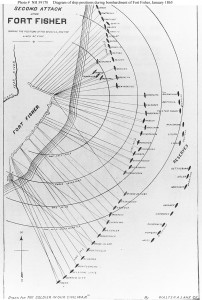
Monitor Saugus in close
John Arnett, a young man from Seneca Falls, New York serving in the U.S. Navy during the Civil War, has already had some notable experiences. His ship the Westfield was blown up on New Year’s Day 1863 during the Battle of Galveston. Ten days later his new ship the Hatteras was sunk by the CSS Alabama. We haven’t heard too much from John for the past couple years, but 150 years today he wrote a letter to his father describing the Union capture of Fort Fisher. John’s ship, the monitor Saugus participated in the heavy federal bombardment of the fort from January 13th. The Saugus’s main gun exploded early in the fight, but John and most of the rest of the crew escaped serious injury. The rebels were not able to do any serious damage to the tough-skinned Saugus or its crew. The sailors, marines, and soldiers who assaulted the fort by land on January 15th were not quite as fortunate. Nevertheless, by the end of that day the fort guarding the approach to the Confederate port of Wilmington had fallen to Union forces. John was able to observe a good deal of the fierce fight.
From a Seneca County, New York newspaper:
THE CAPTURE OF FORT FISHER
DESCRIBED BY A SENECA FALLS BOY.
The following letter describing the capture of Fort Fisher, is from Ensign John P. Arnett, of the U.S. Navy, son of Wm. Arnett, Esq., of this village:
U.S. MONITOR “SAUGUS,”
AT SEA, Jan. 17, 1865.
DEAR FATHER:
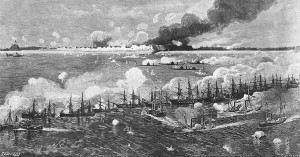
“the shot and shell rained into Fort Fisher”
I wrote you, giving a hasty account, day before yesterday, of the fight at Fort Fisher, but since then I have learned more particulars and can give a more detailed account. The expedition left Beaufort on Thursday morning, the 12th. We all sailed together in regular order and it was a splendid sight to see such a long line of men-of-war, followed by the army transports with the soldiers on board. Everything started favorably, the weather was splendid and sea smooth, and everyone was in good spirits, knowing well that the Rebs would have to do some tall fighting to resist, I think, the most formidable expedition of the war. The distance from Beaufort to Fort Fisher is about eighty miles, and we all went leisurely along, as the attack was not to be made until morning. We anchored about ten miles from New Inlet or Fort Fisher. All along the beach we could see fires springing up for miles ahead, which reminded one of the Scotish Clans, when fires would spring up from the hill tops, giving the alarm at the approach of the enemy. On the morning of the 13th., we formed (as in the last attack) in line of battle, the New Ironsides taking the lead, followed by monitors Saugus, Canonicus, Monadnoc and Mahopac; then came the Frigates Wabash, Minnesota, Powhatan, Susquehannah, Sloops-of-war Brooklyn, Tuscarora, Mohican, Juniata, and the numerous gunboats and smaller vessels. We anchored with the rest of the monitors and New Ironsides close to the Fort and commenced the fight. We fired all day, and the shot and shell rained into Fort Fisher. – The enemy returned the fire as well as they could, but the greater part of the garrison of the Fort was taking refuge in the bomb proofs. As we fired the 100 lb shot our No.1 gun burst, but wonderful to relate but one man was seriously injured. It was a miraculous escape, and one would suppose the bursting of a 15 inch gun would kill outright every person near it. Several were slightly wounded and every one in the turret was knocked down by the concussion, myself being one of the number. We continued firing all that day, and in the meantime the troops were disembarking. The next morning the fight was renewed with vigor. Shot after shot would strike us from the enemy, but these monitors were built to stand “hard knocks,” and well they answered the purpose, as the solid shot would come with a crash against our turret, but would glance off into the water or break to pieces without doing much damage. Night coming on, the grand attack was postponed until morning, but the fire from the fleet was continued all night. Sunday was the third day’s fight. The troops were all landed and ready; the vessels all commenced a terrific fire on the Fort in the morning which was kept up for several hours. About 10 o’clock signal was made for the sailors and marines to land, and immediately small boats could be seen pushing off along side every vessel except the Ironclads. I don’t know how many landed, but think about 2000. Now comes the crisis: The sailors and marines are to storm the sea-side face of the Fort and the soldiers the rear.

mounds and mounds (The sea face of Fort Fisher)
Before I go farther I will give as good a description of Fort Fisher as I can, although I have never been inside of it. The side which we were shelling consisted of, I think, fourteen large mounds of sand. Between the mounds or hills (which I think must be 100 feet high) the guns are mounted. The earthworks were splendid and the Fort was well calculated to resist the attack as it did. The Fort is of great length and mounted in all, I believe, fifty large guns.
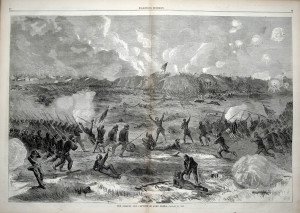
“The brave troops went in with a cheer”
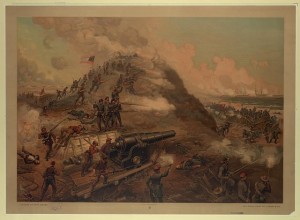
fiendish defense
At a given signal from the Flag-Ship, the charge was made, with a cheer. The sailors being exposed to the most galling fire were repulsed with heavy loss, and the beach was strewn with dead and wounded Blue Jackets. What a sight! The Rebels, on the first charge, swarmed on the parapets with small arms, while one or two guns of the Fort sent the death dealing grape and cannister and shrapnel in the ranks of the sailors, the fleet all the time pouring the shot and shell into the Fort. Finally the sailors and marines were compelled to fall back, and then our attention was turned to that part of the Fort where the troops were assaulting. The brave troops went in with a cheer, and the commenced the most desperate hand to hand encounter which the history of this war can show. The first mound was gained a short time after the charge was made, and the good old stars and stripes were planted there amid the cheers of the fleet and the storming column. A few minutes more and the flag on the first mound was carried to the second, and so on. Our soldiers went slow but sure, the battle-flags of both sides being at times within ten feet of each other. The Rebels fought like fiends, and giving their peculiar yell would make charge after charge only to be repulsed with heavy loss; and so raged the fight, up one mound and down the other side, and up the next mound went our noble flag, moving slow but steady and sure, its folds being perforated by the enemy’s bullets, but still gaining and driving before it the Rebel standard. But to show how the Rebels fought, I must tell you what I actually saw. While our troops were fighting hard for the possession of the fifth mound , our troops being on one side and the enemy on the other, I saw a Rebel run boldly up to the top, and exposing his head and shoulders raise his gun, but before he had time to discharge his piece he was pierced through and thro’ by the fire of our troops, and he fell dead where he stood; but he had no sooner fell than another followed him and shared the same fate, and then another and yet another, until I counted five, all falling in nearly the same spot, the last having a chance to discharge his gun but falling immediately after. Our troops then made a charge and carried the mound hansomely [sic], the Rebels falling back to the next one, and so it went on. Night came on but the fight is raging, and the sun set over the most horrible scene that I ever witnessed. The fleet all the time kept firing into that part of the Fort where the enemy is taking refuge. Nine o’clock and the firing is becoming slower; our troops and some sailors in the Fort are intrenching that part of which we have already possession; 9:30, with a cheer that resounded far out over the sea, our soldiers (God bless them!) made the last desperate charge, which was decisive, driving the enemy in one corner of the Fort. Then all was still as death for a few minutes, and we knew the fight was over. The suspense was painful to us, although there was not a doubt in our minds as to who were victors. Suddenly, three times three cheers for the Union was heard from the Fort, which was echoed down the beach, and army signal lights from shore to the Flag-Ship made us doubly sure of the victory being ours. The Flag-Ship sent up rockets, which was answered by all the vessels of the fleet, and then the blue lights rockets, steam whistles, bells and cheers made a scene which is not very often witnessed, and so ended one of the hardest fought battles of the war.
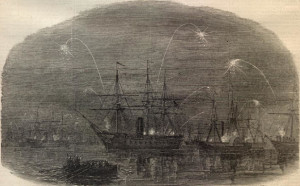
“The Flag-Ship sent up rockets, which was answered by all the vessels of the fleet”
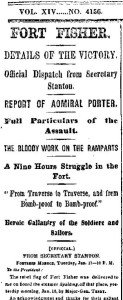
“desperate hand to hand encounter” (NY Times 1-19-1865)
The next morning the prisoners were marched out of the Fort to be put on board the transports and taken North. I believe there were 1800 prisoners taken by our troops. The day after the surrender a terrible accident occurred in the Fort by which over one hundred of our troops and some sailors, besides some rebel prisoners lost their lives. By the carelessness of some one, a fire was built in the Fort, and the powder being strewn around, the fire was communicated to the magazine and it blew up with a terrible explosion. We went to sea yesterday, and I did not have a chance to go into the Fort, and while I am writing we are off Hatteras, with good weather, bound for the Norfolk Navy Yard, where we are ordered for repairs. We left the rest of the fleet off Fort Fisher, and I suppose the troops will follow up their success and take Wilmington, which is several miles up Cape Fear River. We lost some valuable Naval officers when the assault was made on the Fort – several Lieutenants and, I believe, one Lieutenant Commander were reported killed before we left.
Providence has favored us in everything from the start, as we have had splendid weather ever since we left Beaufort. Had it been otherwise we could not have operated at all against the enemy. We expect to arrive at Hampton Roads to-morrow afternoon if this weather lasts. My health is good. Affectionately, your son,
JOHN.
Two of the images above were published in the February 4, 1865 issue of Harper’s Weekly and can be viewed at Son of the South.
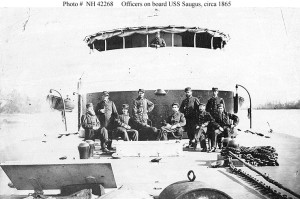
Ensign Arnett aboard? (Saugus’ officers, probably on James River early in 1865)
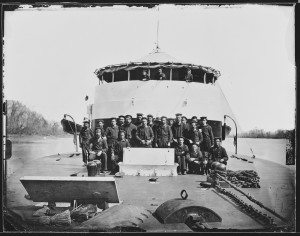
Saugus’s crew (circa 1864-65)

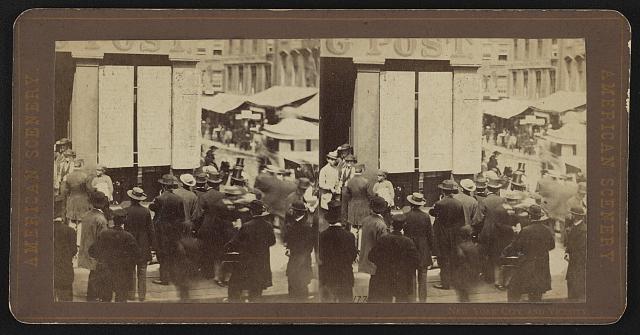


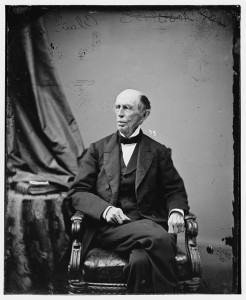
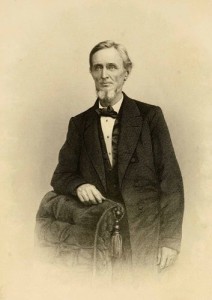
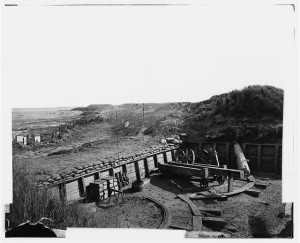
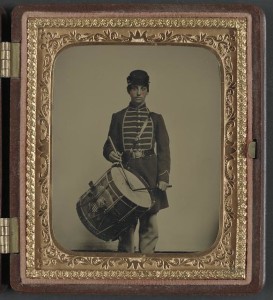
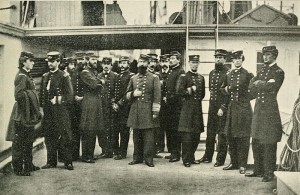
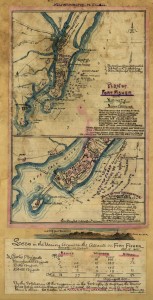
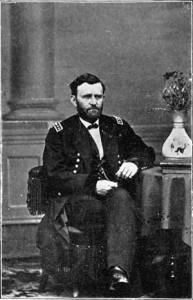
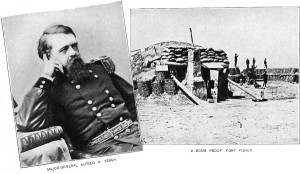
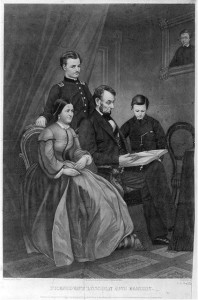
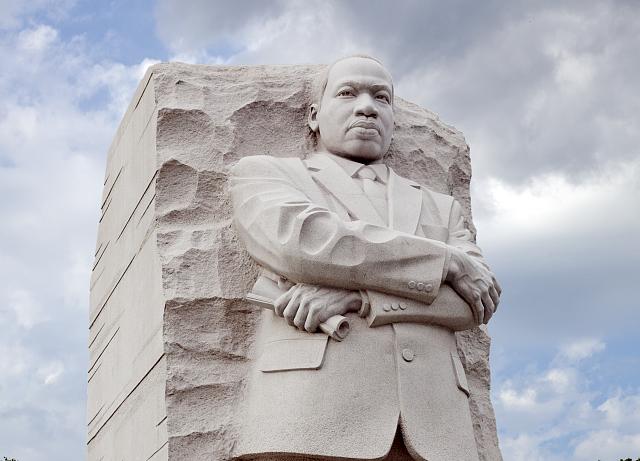









![Campaign sketches. The coffee call (by Winslow Homer, Boston, Mass. : Lith. & pub. by L. Prang & Co., [1863]; LOC:LC-DIG-pga-03007)](https://www.bluegrayreview.com/wp-content/uploads/2015/01/03007r.jpg)